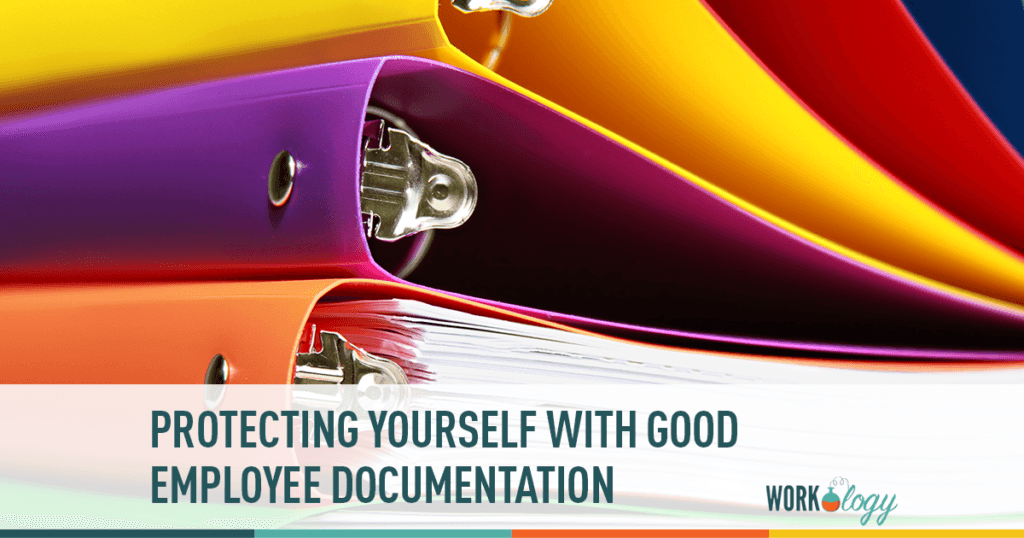Protecting Yourself with Good Employee Documentation
There always seems to be a zillion things vying for our attention in the HR industry. I’m aware that I’ve been guilty of deprioritizing documentation because there always seemed to be more important things to finish. But in truth, documentation ought to come first. It can help you make the best decisions for your staff and shield your business from expensive lawsuits.
What is Documentation?
Documentation can include notes on counseling sessions with employees, performance reviews, warnings, commendations, investigation notes, interview notes and anything that documents employee performance. While it is not necessary to note every little thing that an employee does, it is important to write down things that could be used in making employment decisions (e.g. promotion, termination, disciplinary action).
Having standard forms for the various types of documentation allows you to plug in relevant information. A consistent format also allows for easier review in the future.
Sign Here
When it comes to things like performance reviews, warnings and termination letters, you will give a copy to the employee and keep the original for the employee’s file. Always have the employee sign and date the form. It is also a good idea to have a signature and date from the manager or HR person reviewing the document with the employee.
Sometimes an employee refuses to sign a form. In this situation, the person reviewing the form with the employee should sign the form and make a note stating, “Employee refused to sign.”
Stick to the Facts
Avoid including opinion and speculation in your documentation. Stick to the facts. Name people using first and last name as well as title. Dates should be noted with the year.
When writing investigation notes, be detailed. Write what people say happened, and do not be tempted to write what you think happened. Conclude your investigation notes with a summary of how the investigation was resolved and what action was taken. List the names and titles of investigators as well.
Mind Your P’s and Q’s
Finally, remember to write clearly. Your writing should be clear because it may be read by employees of your organization long after you have left. You don’t have to approach your documentation as though you were HR Shakespeare, as fascinating as it might be to read investigative notes in iambic pentameter. There is no requirement for your documentation to be imaginative and interesting. Instead, concentrate on expressing what happened in whole words and with clarity.
Let’s take a look at a flowery example from Shakespeare and then how that might be written in good workplace documentation:
Friar Laurence said, “Romeo, there dead, was husband to that Juliet, and she, there dead, that Romeo’s faithful wife. I married them, and their stol’n marriage day was Tybalt’s doomsday, whose untimely death banished the new-made bridegroom from this city.”
Good Documentaiton:
Friar Laurence stated that he married Romeo and Juliet. On the day of the wedding, Romeo killed Tybalt and had to leave the city as a result.
Proofread and correct any spelling or grammar mistakes. You do not want someone in the future to try to figure out what you meant because typos and errors make your meaning unclear. With all your documentation, it is good to get a colleague to proofread your work.
File Documents Away for Safekeeping
Now that you have all this great documentation, where do you put it? Performance reviews, warnings, termination paperwork and commendations should go in the employee file. Investigation notes should be kept in separate investigation files. Most documentation contains sensitive and confidential information, so your files should be stored in a place where access is limited.
If you type your documentation and store it on your computer or a server, it can make it easy to search in the future when you are trying to remember specific facts about an investigation or employee issue. If you do this, be sure that your files are stored in a secure folder.
What this all means?
If you ever face a lawsuit or formal complaint for a termination or disciplinary action, good documentation could become a big part of defending your decision. Good documentation may help justify your decision. Therefore it is important to set aside a little bit of time each week to catch up on your documentation. Silence your phone, close your email and close your door.









